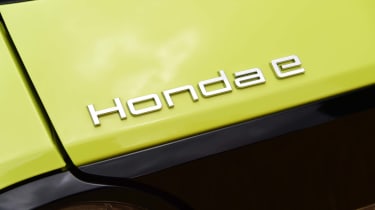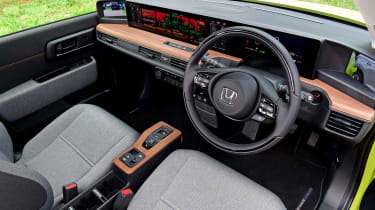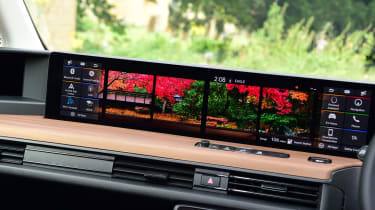Honda e electric city car: prices, specs and new limited-edition model
Just 50 examples of the new Honda e Limited Edition are coming to Europe, priced from £38,120
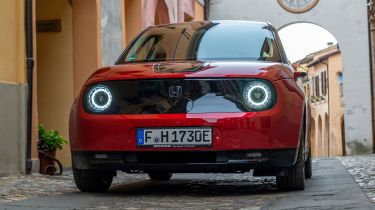
Honda has unveiled a 'Limited Edition' version of its pure-electric city car. The Honda e Limited Edition receives a select number of styling tweaks including black badges all round, Premium Crystal Red paint and an exclusive set of 17-inch black alloys. Just 50 examples are coming to Europe, with prices starting from £38,120.
The new Limited Edition model is based on the Honda e Advance, which means it gets a 152bhp electric motor powered by a 35.5kWh battery. Range is likely to remain the same – a little over 130 miles on a full battery – and the same goes for the e Advance's 8.3-second 0-62mph time. The Limited Edition model will also feature the Advance-spec's upgraded sound system, rear-view mirror that doubles up as a reversing camera and a semi-autonomous parking mode.
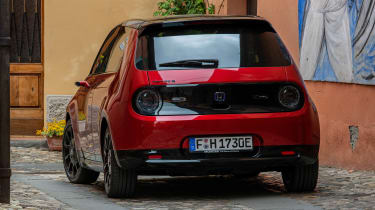
Every version of the Honda e still gets the full bank of touchscreens that dominate the cabin, as well as the ‘virtual mirror’ camera system that replaces conventional side mirrors. Reducing drag by 3.8% – and therefore boosting the car's efficiency, range and quietness on the road – the cameras feed their footage into a pair of six-inch monitors that bookend the dashboard.
The entry-level 134bhp Honda e now starts from £34,420, rising to £36,920 for the higher-spec 152bhp Honda e Advance. You can also add what Honda calls the 'Style Pack' and 'U.R.B.A.N Pack' that tweak the car's looks, and get five paint colours to choose from: Platinum White Metallic, Crystal Black Pearl, Crystal Blue Metallic, Modern Steel Metallic and Charge Yellow.
Honda will introduce its second electric car, a zero-emissions SUV previewed by the brand's e:Ny1 prototype, in 2023. It's one of 30 new EVs the Japanese brand plans to launch worldwide by 2030, including potential electric successors to the Honda NSX and Honda S2000 sports cars. Honda has also formed a new company with electronics giant Sony to develop and sell electric cars. Their first jointly developed EV is due to arrive by 2025.
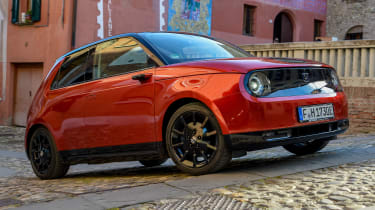
Honda e battery, range and charging
All versions of the Honda e use the same 35.5kWh battery for a range of between 131 to 137 miles depending on whether you go for 17 or 16-inch wheels. Despite rivals like the Fiat 500 being able to cover close to 200 miles on a charge, don't expect a longer-range Honda e any time soon. Takahiro Shinya, assistant large project manager for the Honda e, told DrivingElectric that "it’s not possible to get more batteries or more range into the e with battery technology as it is".
The zero-emissions city car is compatible with Type 2 and CCS chargers, with the port hidden under the black panel on its bonnet. It can charge at rates of up to 100kW, so an 80% top-up will take around 30 minutes from a rapid charger while a 7kW home wallbox will fully replenish the battery in five hours. LED lights indicating the car's state of charge are visible through a glass panel, with graphics also displaying information on screens inside.
The e has been built on Honda’s latest platform for electric cars, with a single electric motor driving the rear wheels. It's 3,895mm long, 1,750mm wide and 1,495mm tall, making it smaller than rivals like the BMW i3 and Renault ZOE. As such, it'll only seat four people, however a full-length bench in the rear affords enough space for two full-sized, adult passengers.
Concept and design
The look of the Urban EV concept generated a lot of interest when it made its debut in 2017, and it’s easy to see why. It managed to mix the retro looks of the 1970s Honda Civic outside with a cutting-edge, minimalist interior dominated by a digital screen running the full width of the dashboard.
There were also plenty of details on the car that previewed the direction Honda design will take in the future. For example, the backlit blue logo will appear on all of Honda’s electric cars, while the display between the headlights shows charging status when it’s plugged in.
The most noticeable difference between the Urban EV and the e Prototype was that the former's three-door design has been ditched in favour of a more practical five-door body. Meanwhile, the nose and pillars have been made bulkier to add strength for safety.
Interior and technology
There are several developments from 2017’s concept car: while the long, digital screen remains, it has been split into sections across the length of the dashboard. Two 12.3-inch screens sit in the middle, giving access to the car’s range of apps and other functions. The left screen controls the sat nav, vehicle settings and a ‘Personal Assistant’ feature, while the right portion houses DAB radio and charging information.
The conventional instrument display has been replaced with a digital readout behind the steering wheel, although the Japanese carmaker has resisted the temptation to digitise everything: buttons for voice control, cruise control and volume adjustment can been seen on the steering wheel, in addition to a camera button on the right stalk.
The Honda e introduces a new level of voice-recognition technology for the brand. The Honda Personal Assistant is activated by saying 'Okay, Honda' followed by a command. As with similar systems such as that in the latest Mercedes models, Honda’s voice-control system learns an individual’s voice and accent over time.
Honda e owners also have use of the 'My Honda+' smartphone app, which allows remote control of charging and climate control, as well as location monitoring, advanced navigation functions and more. You can even turn your phone into the key, as you can with the Tesla Model 3.
Traditional climate-control dials are found on the centre console, and Honda has added a number of buttons to the wooden trim above the vents. Two 230V power outlets and one 12V outlet feature as well, as do a pair of USB sockets and a single HDMI port. Honda says the infotainment system features a “clean design” and “intuitive technology”, representing a break from the systems used on its current range.
Drivers can choose between 'normal view' and 'wide view' modes for the digital side mirrors, increasing visibility by 10% and 50% respectively compared to normal mirrors, according to Honda. The company says it has tested the system extensively to ensure it works in all conditions. The shape of the camera unit is designed to stop droplets forming on the lens, with a water-repellent coating helping to prevent a build-up of dirt. The brightness of the display adjusts automatically, and in reverse gear, guidelines are overlaid on the screens to help drivers navigate tricky parking manoeuvres.
Most Popular

EV Deal of the Day: budget-friendly Ford Capri for just £234 a month

